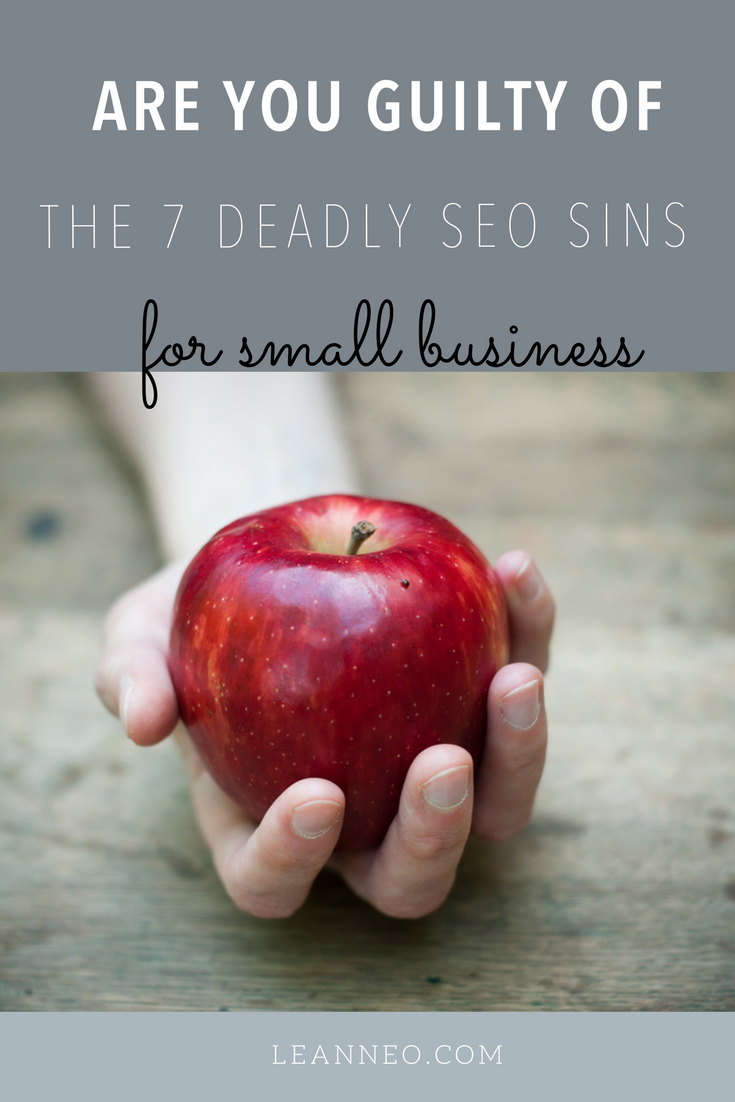7 deadly sins of SEO for small business. Are you guilty?
/Part 4 of my 5 part series on how to drive FREE traffic to your website. Missed parts 1, 2 and 3? You can find them below
- How to increase website traffic (for FREE)
- Branding you. How to build brand authority in your niche
- How to create content that drives traffic to your small business website - for FREE
This week we look at SEO - or Search Engine Optimisation. I am looking at the 7 key areas that you MUST have within your website so Google loves you!
Many small business owners make the mistake of thinking its all about ‘keywords’.
As in, "when you build my site will you put in all the keywords?" I have heard that many many times.
Keywords are actually the phrases that people type into google to find you online. We type in our questions, or the product or service that we are looking for and results appear. These results appear via the search engine ranking algorithm that Google keeps secret. -they do tell us the best ways to achieve the best results. We need to bring our keyword phrases into all aspects of our website content writing. This includes how we label pages, headings and subheadings within the body of our content.
I have outlined some of these points previously in this blog post "Why Google is ignoring your website and how to fix it"
As well as in this more recent post, SEO Simplified - It's all about answering your client's questions.
For the true Google nerds amongst you, you might find these 2 links really helpful.
Below, I have listed my MUST do steps to ensure that your website is in the best possible shape for Google to rank it well.
Are you guilty of committing any of the following 7 deadly sins of SEO for small business?
These steps can actioned for FREE - but you do need to put some time into them to make it all happen.
1. Confusing Page Titles, Page Names and Navigation Names
When a website is being built, the pages that are often given very simple names. These pages form the base of the website navigation. They then go on to become the page title and also the page name.
Whilst is may look like they can be all the same - they all need to be different as they serve unique purposes.
For each page of your site, you need to have 3 names for each ( or at least 2 names ).
Navigation Name
This is the name of the page as it will appear in the navigation. Often it is a shortened version of the page name. Your website CMS should outline how you can make this appear shorter to fit in the navigation menu. Navigation names are visual cues to help people find their way around your site.
Page Name
This is the name of the page as people see it when they land on the page. It has both a visual element and a search element. Page names are important to google if we apply a tag to the text to tell google that this text is important.
At your website your page names need to be wrapped within a H1 tag. This because the name of the page is an important trigger for Google to rank your website page. Google will rank your page based on how well it meets the search criteria. If you name your page "About Us" or "Products and Services", this won't help Google rank your site in a search result. Whilst is makes perfect sense visually, from Google’s perspective it doesn’t help to rank your page well.
This is where page titles come into play.
Page Titles - this is the most important piece of information on your page.
You read that right.
Getting page titles correct at your website t is the most important piece of SEO work you will do. Get this right and all else will follow through.
You need a unique page title for each page of your site. These should be no longer than 60 characters.
The page title is the first piece of information that GOOGLE sees. This needs to reflect what the page is actually about. It needs to describe the page content and address your client’s question or need. Website owners often forget to update this information. We need to describe in more detail what the page is about. This will help Google to rank your page.
Google will rank each page individually, determining how to best respond to a query. So don't think about your website as one thing, rather treat each page as important. You will achieve better search engine results this way.
If your page titles say
About Us - I say - About who?
or
Products and Services - I say - What products and services.
This is exactly what Google thinks to.
So don’t: -
Forget to do this whenever you create a new page at your website.
Forget to create a page title for your home page. Calling it home is a common mistake.
Forgetting to create unique page titles for EACH page
Use your business name in the title and attach the navigation name of the page to the page title - be descriptive.
Make sure you check these different names each time you create a new page.
It is SUPER important.
2. Not having a coherent focus on your overall message in your website & navigation structure
In my previous blog posts on generating free website traffic, I outline how we need to think like our customers. What are they actually looking for and how can we mould our message to meet their needs? This needs to flow across all the content of your website to ensure a good SEO ranking. When we focus on what our customers need, rather than what we want to tell them, it becomes easier to write content. Our content will be more customer focussed and not broadcasting our sales message.
Not sure what I mean?
This week I have spent time creating categories for all my blog posts. They are now grouped around what my ideal clients are looking for. I now also have them grouped by the 4 key areas of digital strategy, WEB, SOCIAL, CONTENT & SEARCH.
3. Not updating your content, regularly
If you don’t make changes to your website, you can’t possible expect Google to rank you well. An active site will always rank better than an inactive one. Otherwise you are going to need to do a considerable amount of paid advertising to be found online.
This is why blogging is recommended by most web companies and digital marketers like myself. It provides an easy way to update your content.
It is often hard to address our customers questions from our products and services pages. This is where blogging comes into its own. Blogging allows you address specific customer needs and get found via searches online. By creating a how-to post to educate your market , you are are setting yourself up for SEO success.
See my examples below
SEO tips for small business - and these are FREE!
How to create content that drives traffic to your small business website - for FREE
4. Not claiming your Google+ Local place
Whilst G+ hasn’t set the social world on fire, you still need a G+ Local account to claim your spot inside Google places. This is also how you make sure your location, contact and map details are accurate and up to date. This is where you can also track your Google reviews.
It is simple to set up - you can start by visiting this link below
Add or claim your business listing
Getting this set up or claiming ownership will mean that your business will be displayed when people are searching for a business like yours in their local area.
This is a critical point. Look out for my tutorial on how to set this up coming soon!
5. Not having a unique page description for each page at your website.
This is where you describe your page content. It allows you to expand on your page title ( which was only 60 characters ) to outline what the page is about. Page descriptions are not used to rank your site inside Google. They can and do help people choose your business over others from a search results page.
Think of it like a little ad for your page but inside google search results. It needs to entice people to click on your website link, rather than the other choices on the page.
Your page description can be up to 160 characters long.
6. Not having in depth enough content on each page.
People often ask me - how long should my page be, how many words do I need? Your page needs to be as long as you need to outline your topic. So don’t worry about pages being too long. If you have more to say on your ONE topic - then keep going, we are all used to scrolling now.
From a search ranking perspective, make sure your page is not too short. There are many conflicting reports about how word count affects page rank. My advice to you - is to try for at least 300 words. But stay focussed on value. If you can’t write more and you are nailing the brief - then that is OK.
Focus on the purpose of the page - once you have done that, don’t think you need to pad out the words to hit some word count target.
7. Not using local listings and other membership based sites.
Make sure you take advantage of ALL the local listings you can.
If you are looking for electrical services in Sydney, then a website that provides a great selection of electricians in Sydney, is going to be very useful to you. This is why so many of these aggregation sites appear on page one of Google. Google attaches relevance value to them and they have considerable traffic.
Make sure your business is inside these sites - even the FREE listing. This will create some great inbound links to your website. It will also help improve your organic search engine rank.
So how many of these 7 deadly sins of SEO are you guilty of?
The number one take away from all the above - is think like your customer.
What are they looking for? How can you structure the names of pages, titles and content to suit them? What do you need to do to ensure that Google will look at how I present my website.
One final thing, make sure that you set up Google Search Console. This was known as Google Web Master tools. Everything you need to know about how to set this up can be found via this link.
How to set up Google Search Console
Need help with the above to kick start your SEO strategy?
Sometimes you need a nudge in the right direction. My SEO audit and keyword analysis report can be the nudge you need.









